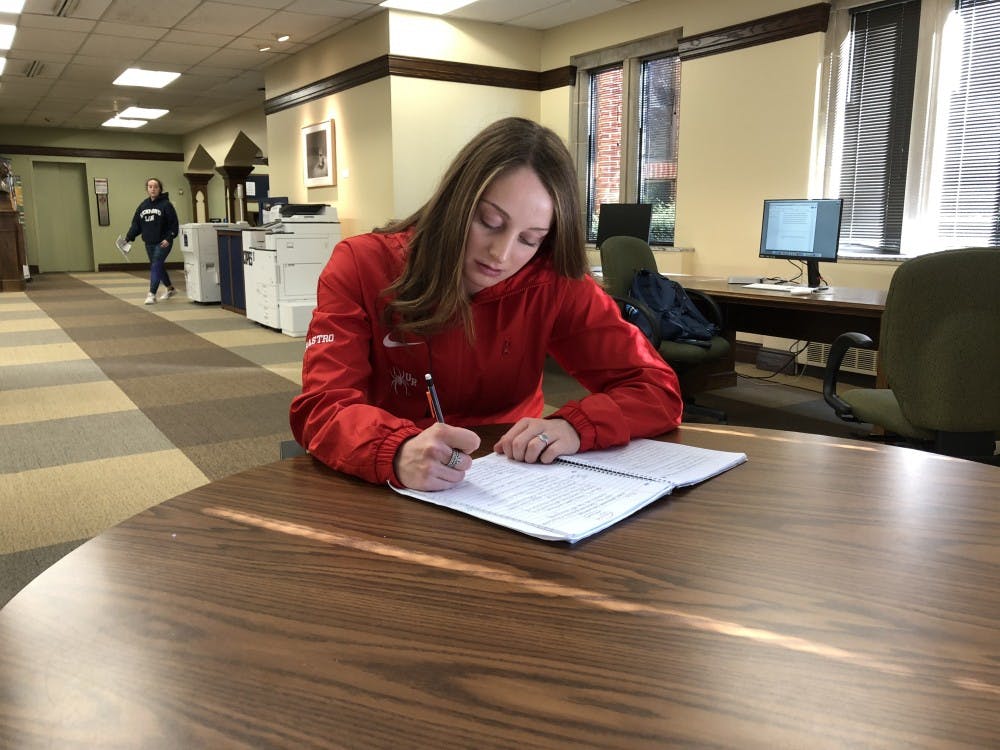All student athletes at the University of Richmond must balance aspects of college life. But first-year athletes face the challenges of balancing Division I athletics, rigorous schoolwork and an active social life all for the very first time, athletes said.
“[College] is more stressful,” first-year swimmer Jenna Carastro said. “I haven’t completely adjusted to it yet. I’m still working on it because I am used to waking up for morning practices, even when I was at home, but school is getting harder.”
Athletes’ daily schedules can differ from sport to sport or just depending on the day of the week, but many are jam-packed with practices, classes, food and homework. For some freshman athletes, the demanding academic workload was most difficult, athletes said.
“First semester [my struggle] was definitely getting homework done and that the amount homework I had was so different — especially with our soccer schedule,” sophomore Abby Erlemeier said. “We had to travel a lot, so I would read on the bus. It’s definitely something you can’t put off.”
This fall, Erlemeier made her usually busy schedule even more hectic, she said. On top of soccer and school, Erlemeier also works two jobs. One is on-campus in the budget office of the Weinstein Center for Recreation and Wellness. The other is at the Shady Grove Family YMCA, where she works around 10-15 hours per week, Erlemeier said.
However, some first-year athletes have shared different opinions on their college experience. First-year basketball player Matthew Grace said that college had been easier than he had expected. He credited coaches and the associate director of academic support for athletes, Courtney Hughes, for helping him manage his schoolwork and schedule.
Senior student-coach and former football player Will Ingle said he was used to freshmen complaining about their schedules.
"Just about every freshman every year will say something about how packed their schedule is,” Ingle said, remembering his own first-year schedule. “We had study hall at 6:30 in the morning every day. It was so unproductive that they stopped it because nobody got their work done.”
When senior swimmer Brynn Robertson thought back to freshman year, she was candid about her early struggles.
“You know freshman year,” Robertson said. “You’re independent, you want to have fun and you want to have the college experience, but I had a very tough time prioritizing school, swimming, social life and trying to put those in order of what I thought was most important.”
Robertson continued to share her experiences from freshman year, eventually landing on the topic of summer registration. She then highlighted the role Assistant Athletic Director for Academics Bruce Matthews played in helping incoming freshman athletes.
“We’re in contact with every freshman,” Matthews said. “We urge them to call us and speak with us. [We] get a handle, you know, on their syllabi. [We] look at assignments and see how things are going to unfold for the term and be realistic about what is possible.”
Enjoy what you're reading?
Signup for our newsletter
Matthews also stresses communication between the student athletes and professors because the players may miss classes, tests, presentations or papers while traveling and the catch-up work can be long, he said.
“The one thing we do is we emphasize they must communicate with faculty and it is a learning process,” Matthews said. “So, how to communicate, how to talk about absences, what to expect from the ranges of responses and how to respond to those.”
One faculty member who has worked with student athletes for a long time is rhetoric and communication studies professor Linda Hobgood, who is also the director of the Speech Center.
“Over the years, not all athletes, but a good number of them, tend to set the pace for the class in ways that when I started teaching I didn’t realize could happen," Hobgood said. “It is very difficult to play college sports, and I really admire the athletes, too.
"They really try to not just be worthy of wearing the school mascot on the field or the court, but also try to be worthy of the degree they are aspiring to earn.”
Some faculty members, such as Hobgood, are more understanding of athletes missing classes because of travel than other professors, athletes said.
When asked what they would tell an incoming first-year athlete, both Erlemeier and Robertson offered the same advice: Find time for yourself.
“You don’t always have to be on 100 percent of the time,” Robertson said. “You are going to go insane if you don’t take time for yourself. And that’s for everyone, but athletes especially."
Contact senior sports writer Jacob Taylor at jacob.taylor@richmond.edu.
Support independent student media
You can make a tax-deductible donation by clicking the button below, which takes you to our secure PayPal account. The page is set up to receive contributions in whatever amount you designate. We look forward to using the money we raise to further our mission of providing honest and accurate information to students, faculty, staff, alumni and others in the general public.
Donate Now



